The American Who Shaped China's Schools and His Effects Today
In this article I am using a number of screenshots taken from the inimitable Mark Passio's @mpassio work. As a result I am donating all of the Steembacked Dollars that I get to this article to him. I highly urge you to check his work out here. Your life will be the better for it.
The topic of our previous article was the hidden origins of the American school system. It was plain to see that many founders of American public schools instituted them not to educate, but to prevent widespread education.
Princeton University president and future United States president Woodrow Wilson said quite clearly:
We want one class to have a liberal education. We want another class, a very much larger class out of necessity, to forgo the privilege of a liberal education and fit themselves to perform specific difficult manual tasks.
If you missed that article, I recommend you read it before continuing.
We are about to examine one of the prime movers in American public schooling, a man named John Dewey. Not only did Dewey deeply affect American schooling, he had an outsized influence on a country I've come to know well these last few years: China.
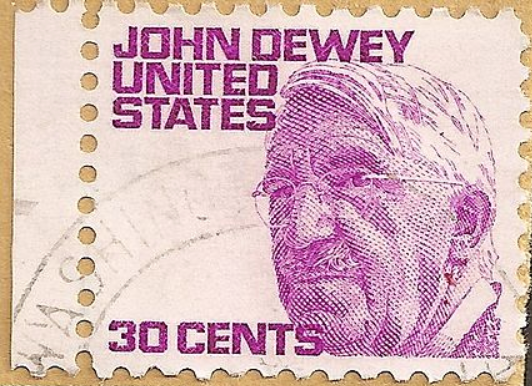
Who Was John Dewey?
John Dewey was part philosopher, part psychologist, part teacher. He began as a high school teacher and decided that that life was not for him. He returned to the university and received his Ph.D.
One of his teachers was psychologist G. Stanley Hall, who coined the term adolescence. Hall had some strange views, such as:
- "Being an only child is a disease in itself."
- Open discussion and critical thinking were a waste of time in schools.
- Characterizing young children as "savages" who needed physical beatings and authoritarian discipline to burn out the evil inside of them.
Hall was also a eugenicist, one who believed that people with "desirable" traits should be encouraged to have more children, while those with "undesirable" traits should be discouraged and even prevented from having children, all in the best interests of society.
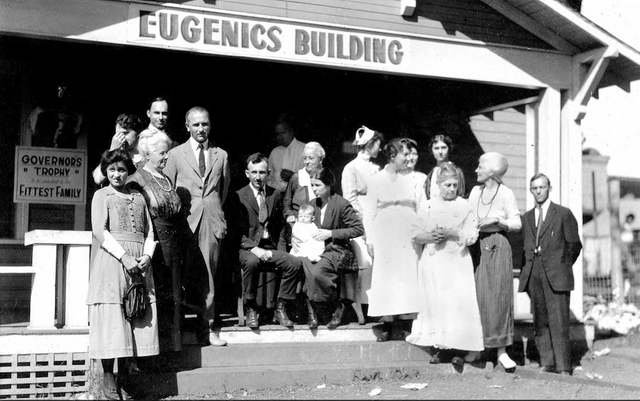
The eugenics building in Topeka, KS with the Governor's Trophy for the "Fittest Family."
Many prominent public school advocates, such as Dewey's Columbia University coworker Edward Thorndike viewed school as an effective form of eugenics when he said,
[Schools would establish conditions for] selective breeding before the masses take things into their own hands.
Perhaps that was what Dewey was referring to when he said,
Every teacher...is a social servant set apart for the maintenance of the proper social order and the securing of the right social growth.
Men at the highest levels of American society supported eugenics. Apart from generously donating funds to influence public school curriculua, the Rockefeller and Carnegie Foundations also funded eugenics research in the USA and Adolf Hitler's Germany.
The New School
In 1919, he co-founded The New School in New York City. It was meant to be a university where students could gain an "unbiased understanding of the existing order, its genesis, growth and present working." This university later served as the refuge for many of Germany's Marxist teachers who fled persecution from the National Socialists (Nazis) in the 1930s. Today, a large focus of its philosophical teachings are the works of this "Frankfurt School" of Marxism.
If it comes as a surprise that an American school is openly teaching Marxism, I invite you to look more deeply into the connection between Wall St., New York City, and Communism. European and Wall Street bankers financed Lenin's 1917 "sealed train" into Russia, culminating in the Bolshevik Revolution. Woodrow Wilson personally assisted Leon Trotsky obtain an American passport to travel to Russia unhindered.
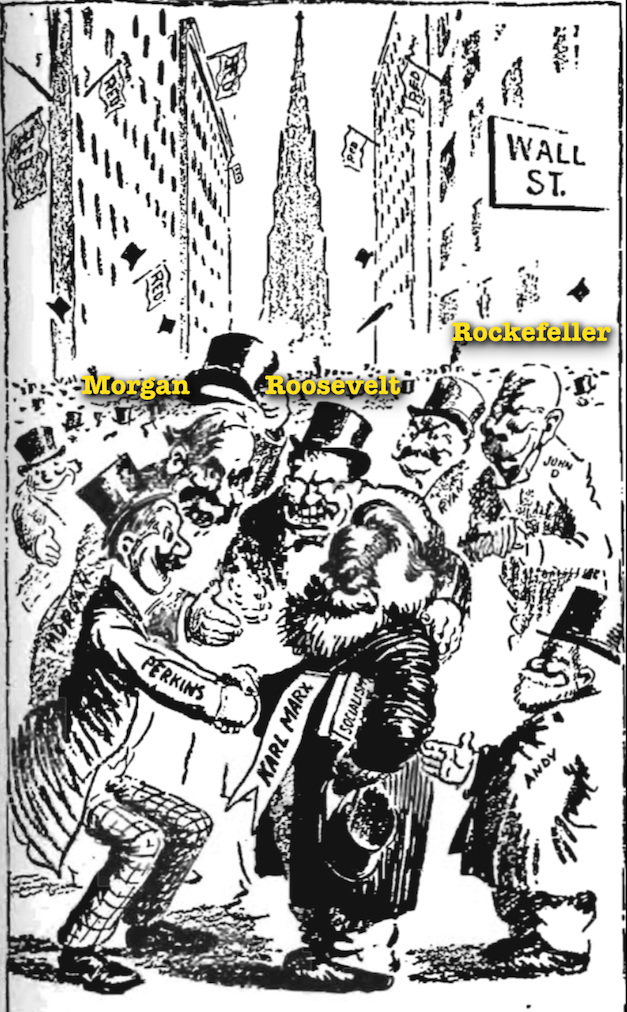
A cartoon from a St. Louis newspaper in the 1910s, big businessmen and Teddy Roosevelt all eager to greet Karl Marx
The Dewey Commission
John Dewey was interested the name of a Communist revolutionary. In 1937, John Dewey chaired the committee to determine if the charges levied by Josef Stalin against Leon Trotsky were valid. They declared Trotsky innocent.
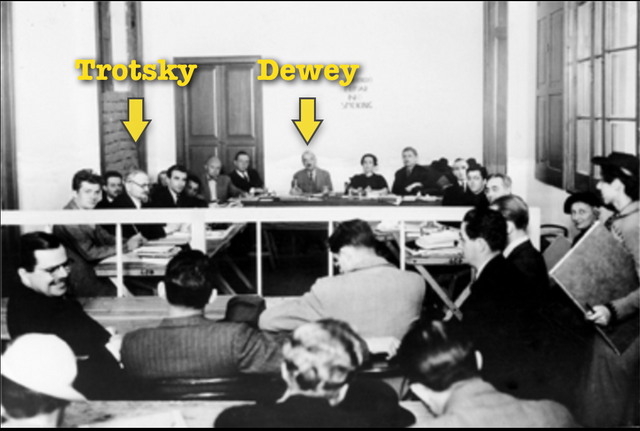
A photo of the Dewey Commission hearings in 1937
His Views on Education
During the twentieth century, Dewey was one of the most influential thinkers on education across the world. His thinking helped shape much of modern education. Here are some of my favorite quotes:
- "The purpose of education should not revolve around the acquisition of a pre-determined set of skills, but rather the realization of one's full potential and the ability to use those skills for the greater good." - My Pedagogic Creed (1897)
- “The thing needful is improvement of education, not simply by turning out teachers who can do better the things that are not necessary to do, but rather by changing the conception of what constitutes education.” - The Relation of Theory to Practice in Education (1904)
- "No one can be really successful in performing the duties and meeting these demands [of teaching] who does not retain [their] intellectual curiosity intact throughout [their] entire career." - Teachers, Leaders, and Schools (2010)
- "I have often been asked how it was that some teachers who have never studied the art of teaching are still extraordinarily good teachers. The explanation is simple. They have a quick, sure and unflagging sympathy with the operations and process of the minds they are in contact with. Their own minds move in harmony with those of others, appreciating their difficulties, entering into their problems, sharing their intellectual victories." - Teachers, Leaders, and Schools (2010)
Dewey was a leading proponent of hands-on learning, understanding that we learn best by doing. He rediscovered with Xunzi said long ago, "Hearing is not as good as seeing. Seeing is not as good as knowing. Knowing is not as good as acting."
Philosophically, Dewey was a pragmatist. He believed that actions should be taken or not taken based on the effects they would likely have. Dewey also had close ties to communism and socialism, serving to exonerate one of its "disgraced leaders." He argued for "democratic" socialism, spoke of a "new individualism," and supported a variety of liberal causes, such as the Gary Plan, featured in the previous article.
The China Connection
Beijing University (likely at the behest of his former students) invited John Dewey to China. He arrived just prior to the May 4th demonstrations of 1919 when thousands protested against the Qing emperors and their ineptitude, something unheard of in China. Seeing a chance to shape a nation of hundreds of millions, Dewey stayed for two years, delivering nearly 200 lectures.
During his stay, he influenced many of China's intellectuals, with his focus on rationality and pragmatism. He was named "Mr. Science" and "Mr. Democracy," and stressed the need to evaluate all tradition and culture to determine if it was still useful. He meshed well with the zeitgeist of the time defined by the New Thought Tide and the New Culture Movement.
Two of Dewey's students were extremely influential in China. Jiang Menglin 蒋梦麟 and Hu Shi 胡适. Jiang Menglin was the Minister of Education from 1928-30 and the President of Beijing University before that. Hu Shi was a later president of Beijing University, served as Dewey's translator during his time in China, and was nominated for the Nobel Prize in Literature in 1939.
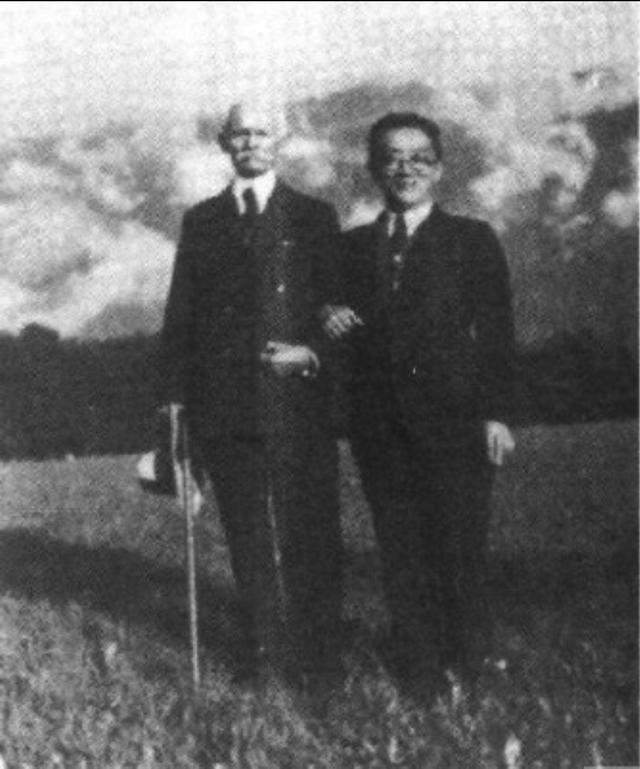
John Dewey and Hu Shi together in the late 1930s
Another educational leader at that time was Tao Xingzhi 陶行知 who studied at Columbia while Dewey was a professor there. Tao Xingzhi founded many of China's first rural schools, and one of the first teacher training colleges, Nanjing Xiaozhuang University.
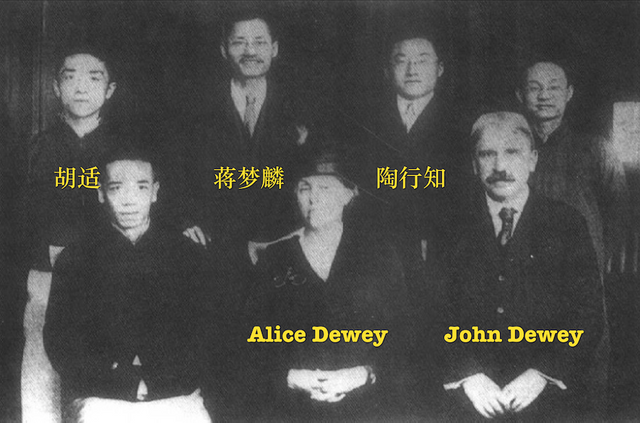
John Dewey, his wife, and a few of his influential Columbia students
The Results
It seemed John Dewey's efforts were successful; he had a sizable impact on American and Chinese schooling. What were the results of his actions? What did his followers do with his teachings?
This Goes On Your Permanent Record!
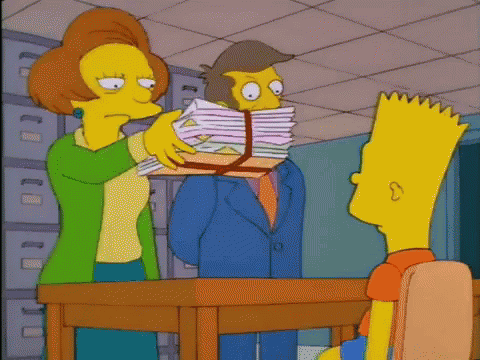
Around 1910, John Dewey and other American educators began to transform American public schools in order to serve the needs of big business and government. The men might have had good intentions, believing that government and corporations were forces of positive change.
Stanford Graduate School of Education Dean Ellwood Cubberley explained very clearly that in schools:
Children are to be shaped and formed into finished products...manufactured like nails, and the specifications for manufacturing will come from government and industry.
American schools began to track their students. The Carnegie Foundation's Ralph Tyler defended the practice as the "moral right of institutions."
"Trouble making" students would be threatened that their behavior would be recorded "on their permanent record!" The threat being that misbehavior at eight years old would equate to an adult life of poverty and misery, much like the threat of misbehavior on earth would equate to an eternity of suffering in hell.
The Chinese Dang'an 档案
The Chinese took it a step further. It's called "the record" or dang'an in Chinese and it contains much more than school grades or disciplinary "incidents." Doctor's visits, psychiatric profiles, comments from authority figures all can be included and none of it is available for view.
A friend showed me the exterior of hers once. It was a large envelope sealed shut, warning of the penalties of opening it and viewing the details of your own life.

A Dang'an: Your life, in a box that you are forbidden to see
Lately the dang'an has begun to lose its importance, not out of any new commitment to privacy, but because the new Social Credit System called the 天眼 or "Sky Eye," is a much better tracking system.
A rendition of what the coming "Sky Eye" social credit system will look like for its controllers
Doubting Antiquities
As a pragmatist, Dewey urged his audiences to question how their traditions and cultures served them in the present. Were they useful or not?
Dewey's translator Hu Shi was a member of the New Culture Movement. It aimed to modernize feudal China and bring it into the modern age. One of its aims was to question the accuracy and authenticity of historical Chinese texts.
This later fed the fires of revolution in China, initially with the May 4th Movement in 1919 and later in the 1940s.
The rejection of all things old, a twisted version of Dewey's pragmatism can be seen in China's cultural revolution and its exhortation against the Four Olds: Customs, Culture, Habits, and Ideas. During that time, much of China's ancient past was destroyed, never to be recovered.
To quote John Taylor Gatto in his Underground History of American Education:
It's sobering to think of sad-eyed John Dewey as a grandfather of Maoist China, but that he certainly was.
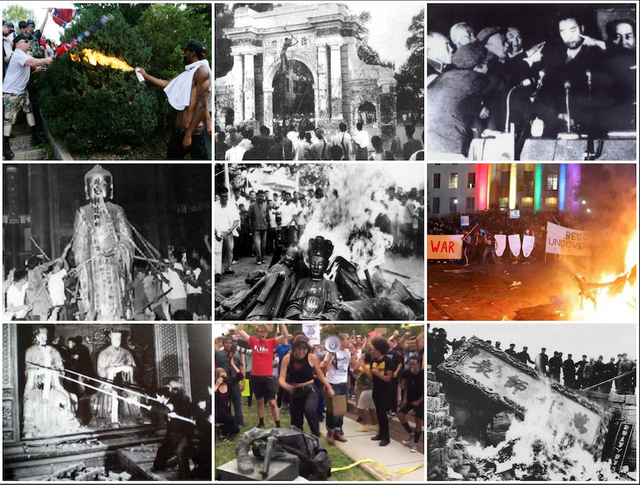
A series of photos taken during the Chinese cultural revolution interspersed with pictures of America's recent domestic turmoil. I was taken aback by the similarities.
Marxists In New York City
What has The New School brought to the world? One thing is known as "Cultural Marxism."
When Germany's National Socialists began persecuting Marxist professors in the 1930s, many from the Frankfurt Institute for Social Research fled to the United States. Many were invited to The New School and continue their teaching. These Marxist professors were funded by the Rockefeller Foundation.
Why were they known as "Cultural Marxists?" After the first world war, they were at a loss to explain why the workers of the world hadn't yet united. It had been over 70 years and besides the Wall-Street-financed Russian revolution, not much else had occurred.
They concluded that not just capitalism but all Western culture was oppressing the workers. The Western workers were under a form of mind control. In order for the worldwide Communist revolution could manifest, Western culture had to be destroyed.
They called themselves Critical Theorists and their method was to criticize everything about the West*: Its history, music, art, literature, values, and traditional family. As Critical Theorist Walter Benjamin said,
"There is no document of culture which is not at the same time a document of barbarism."
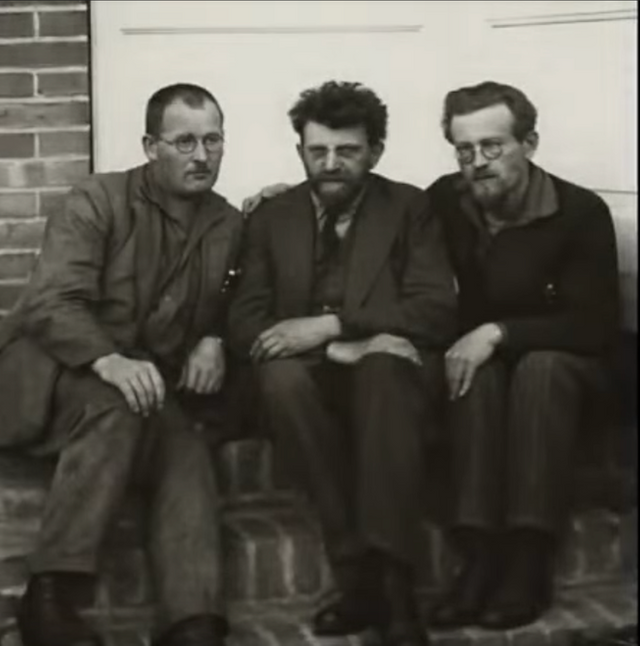
Critical Theorists Theodor Adorno, Max Horkheimer, and Bertolt Brecht, described as "Men who would wear full suits in 80 degree weather while living on the beach in California."
Professors of the Frankfurt School taught at Dewey's New School, at Harvard, Brandeis, Michigan State, UC San Diego, and the Rockefeller-funded Universities of Chicago and Columbia.
It seems they have been extremely effective. Historic or "heritage" America has the perception of being "backwards," "outdated," or "repressive" while things going against the mainstream are "new," "modern," or "progressive."
For example, the constant focus on LGBTQ issues in America, which directly affect only a small number of the population, yet are constantly discussed:

A video from Google highlighting a "new" family. I have no problem with people choosing to live like this; it's non-violent. However, I do think that the attention given to this issue, which affects a very small number of the population, is done deliberately to destabilize society.
What stands out most to me is the proliferation of "modern" architecture:
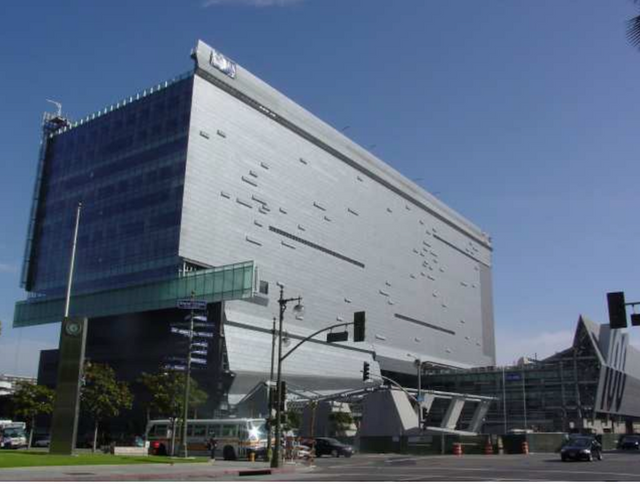
Caltrans District 7 Headquarters, Los Angeles, CA. Built in 2004.
Below are a series of pictures, one with a classical design and the other with a "modern" replacement. Which version do you prefer?
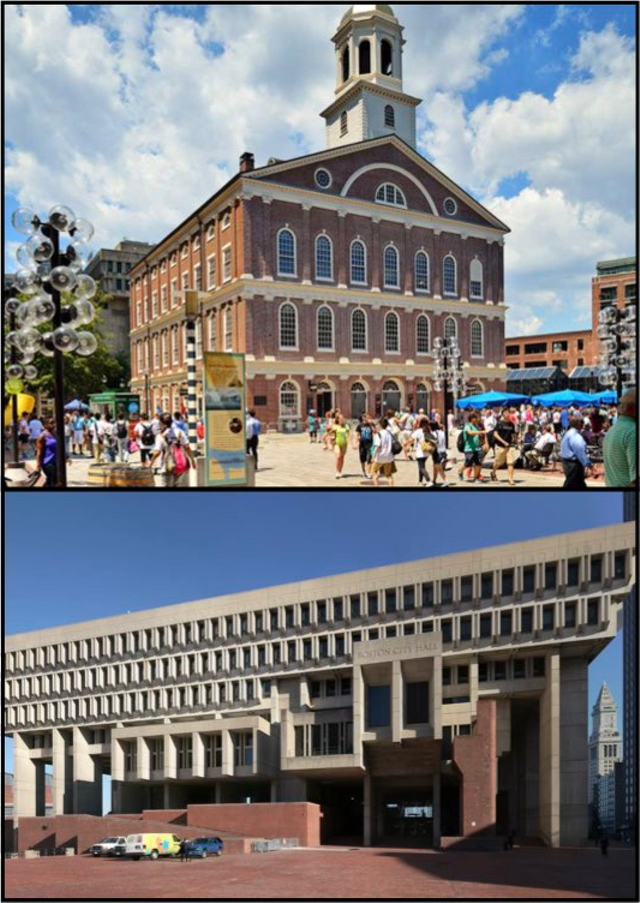
Boston's Fanueil Hall, built in the 1700s above and the "modern" city hall built in 1973 below.

New York City Penn Station's original concourse, built in 1910 is the top picture and below it is today's "modern" concourse.

Classic gentle Asian architecture on the top. Below is China's "modern" Chongqing Guotai Arts Center. (CNN Style called it "China, beautified"
Repressive Tolerance
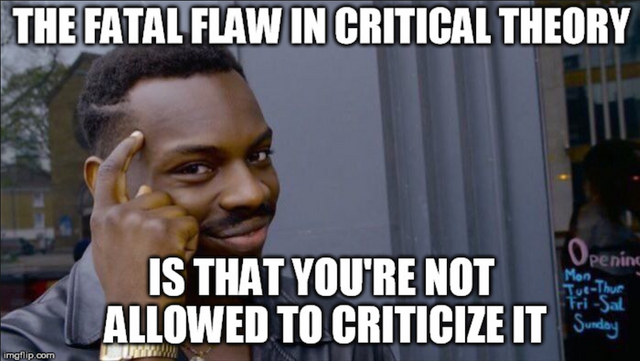
Critical Theorist Herbert Marcuse wrote an influential essay which advocated the use of "repressive tolerance."
In order to destroy Western culture, they needed to promote anything against the mainstream Western culture in the name of "tolerance" and prohibit any contrary opinions.
At universities today, exclusive student groups for minorities are encouragerd but white student groups are looked upon 'with concern.'
The United States today is experiencing a raging debate as to whether there should now be restrictions on free speech if it is deemed "hateful."
Below is a picture taken on the campus of the University of California - Berkeley just last year with the gentleman giving the finger to free speech.
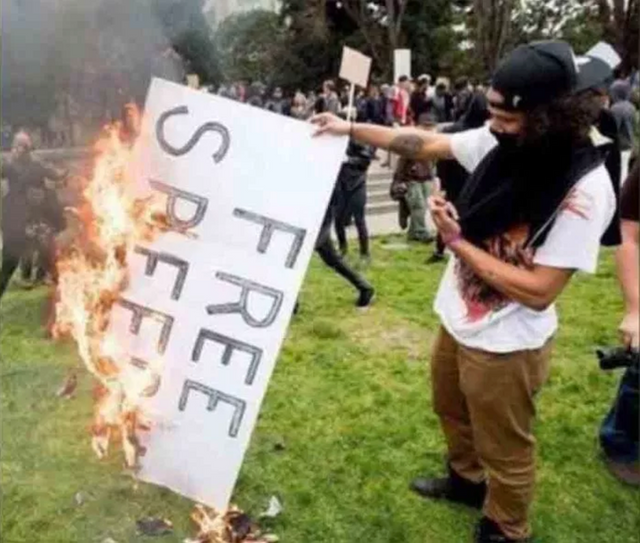
An American burning a stolen sign which reads"FREE SPEECH"
How Did All This Happen?!
John Dewey's quotes on education are so high-minded and noble-sounding. How could the results of his thinking become so ignoble and depraved?
It took me a while, but I understand now. Dewey had detoured off the path toward true understanding and found himself on a dead end.
Dewey was on the wrong side of the One True Divide.

I announced in my first article that we were going to talk about important things. Here we go!
Across humanity, there is only One True Divide which separates us into two types of individuals. It spans race, gender, all of that.
On one side are people who believe it is moral, just, and okay to violently control their fellow human beings.
They believe that violent compulsion, and violent coercion against peaceful people are acceptable "under the right circumstances," "for the right reasons," and "for the right people." These people believe that some people are masters who have the moral right to issue commands, and others are slaves who have a moral obligation to obey the masters.
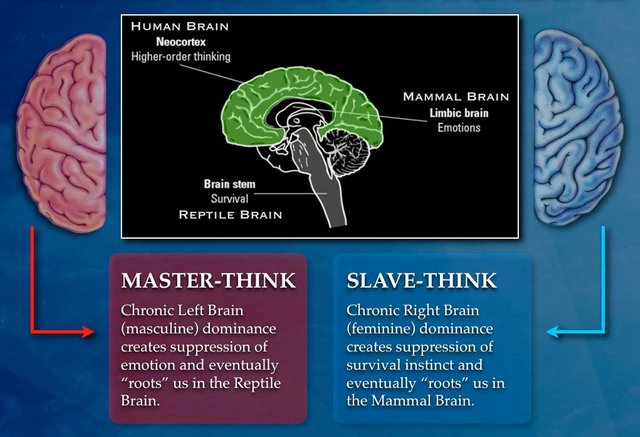
People on this side tend to act like willing masters or obedient slaves
People on this side have psyches rooted in violence and domination on the one hand, or belief systems rooted in submission and surrender on the other.
On the other side are those who know it is never moral, just, or okay to control their fellow human beings.
These individuals tend to have a balanced consciousness.
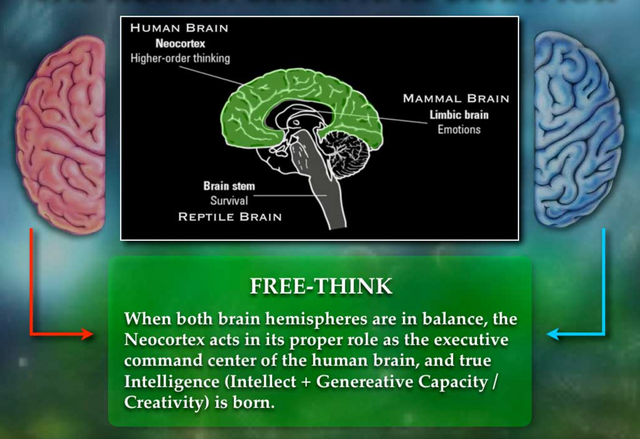
For more information on this, check out the work of @mpassio
These people know the difference between defensive force and aggressive violence. They understand and live by the two pillars of enlightenment: The Non-Aggression and Self-Defense Principle.
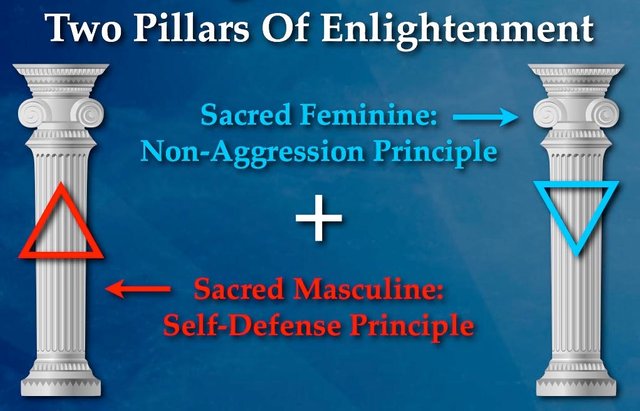
Which side of the divide do you think most people are on?
What Dewey Got Wrong
John Dewey was a staunch advocate of compulsory public schools. Compulsory schools use coercive violence to achieve their methods, both in their funding and operations.
Children in Massachusetts were marched at bayonet point to their school rooms. Today students can be arrested for "truancy" if they are found outside of school during school hours.
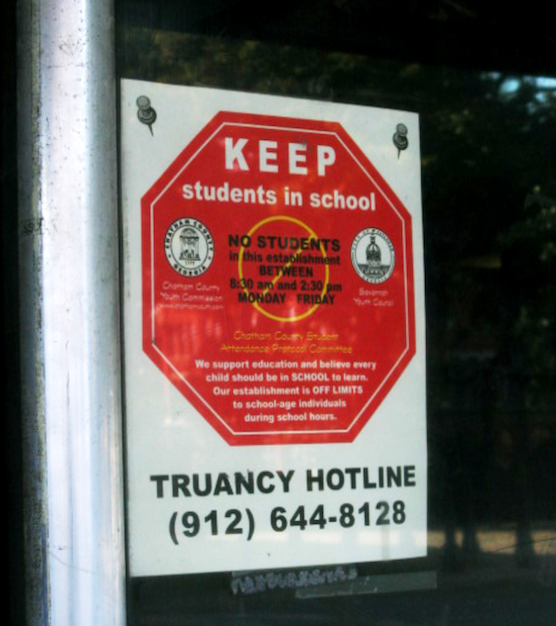
A "Truancy Hotline" phone number to report children out of school in Georgia.
Public schools are funded by taxation, forcing people to pay for their services whether or not they use them. The "customers" have little to no control over the quality of the service, nor how much they will pay.
Imagine if your phone company did that to you. Would you accept it?
Taxation is Theft.
John Dewey's beautiful thoughts on education would have been perfectly suited for teachers who supported themselves on their teaching ability instead of a salary based on taxation, and for students who chose to attend.
Just as one size never fits all, forcing one's own vision of how education "should" work, is a recipe for chaos and disaster.
What Can We Learn From Dewey?
When John Dewey said, "The purpose of education [is]... the realization of one's full potential..." he was exactly right!
The word education means in Latin "To draw forth" or "To lead out." That is what great teachers do! Unfortunately, today's school system does the opposite, by pouring in information whether the student has interest or not.
A truly educated society has truly educated individuals. And these individuals know what is best for themselves. It may come as a shock to hear, but...
You know better than anyone else what is best for you.
Children are no different. Given the freedom to pursue their own passions and interests, they thrive! Learning is as natural to children as breathing, as unschooling advocate Dayna Martin says. If you are new to this official account or are unsure what Unschooling is, you can take a look at my article on the subject here.
I am such an advocate of unschooling because it is right and because it works! Yes it involves creativity and thinking outside the box, but everyone has that ability. Imagine never arguing with your child about school again.
Imagine peace at home.
Everyone has the ability to help their child learn, even if they have no teacher training. As John Dewey said,
"I have often been asked how it was that some teachers who have never studied the art of teaching are still extraordinarily good teachers. The explanation is simple. They have a quick, sure and unflagging sympathy with the operations and process of the minds they are in contact with. Their own minds move in harmony with those of others, appreciating their difficulties, entering into their problems, sharing their intellectual victories." - Teachers, Leaders, and Schools (2010)
Parents, you know your child better than anyone else. You can understand your child better than anyone, certainly better than a teacher who only knows them for 9 months and has 30 other children to concentrate on.
The beauty of unschooling is that the child does most of the "work." The world is their classroom and society is their teacher. Your child will have the internal motivation to learn because it is something they want to know. As a parent, all you need to do is give guidance, support, and encouragement.
Thank you for reading. I hope you liked this article. I really care about this topic so if you want to learn more, please consider reading Dayna Martin's book Radical Unschooling: A Revolution Has Begun
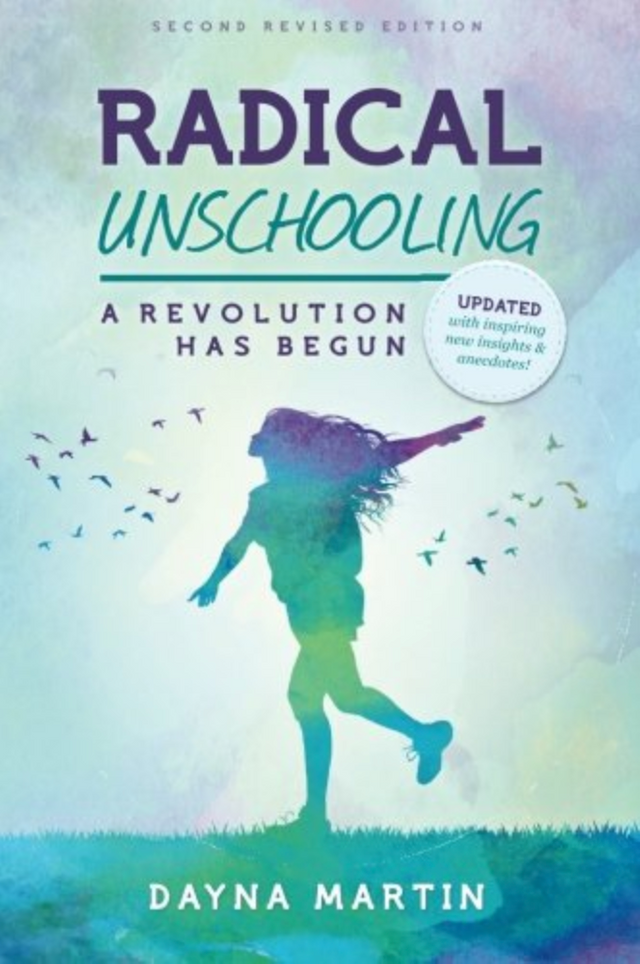
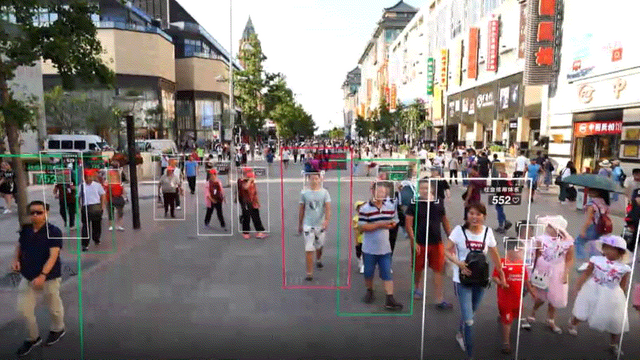
@michaelmcawesome, I gave you a vote!
If you follow me, I will also follow you in return!